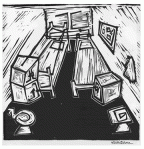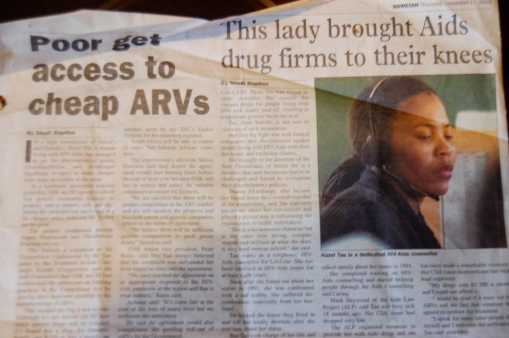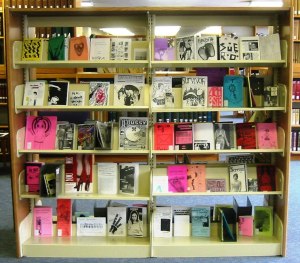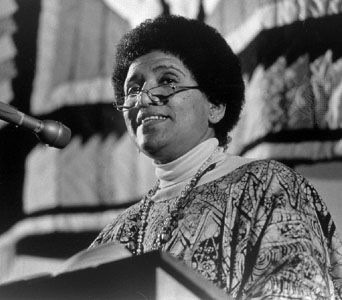At the RPI gathering Sam Lamble, who is also involved in the Bent Bars Project will be facilitating an anti-racist space audit.
For some background on the workshop, we asked him some questions about it. Here are the answers.
Why is it important to explore how the types of spaces we use prevent or enable participation & engagement?
People often assume that physical spaces are politically “neutral” — that politics are about what people do in a space or who occupies a spaces, rather than the actual spaces themselves. But the spaces we occupy are never neutral — all spaces have particular histories, structures, and patterns of use, which infuse those spaces with specific social, cultural, and political meanings. The meanings that become attached to particular spaces can reinforce hierarchies, entrench particular ways of doing things or create barriers to access. So its important to consider how social arrangements of space can affect who is welcome, who is excluded and what kinds of political limits exist in that space.
What is an ‘anti-racist space’?
Acknowledging that we live in a racist society means identifying the ways that racism is socially organized. Because space plays a major role in the organization of social, cultural and political relations in our communities, the physical locations that we inhabit can have an enormous impact on the organization and maintenance of racism. Antiracist spaces are those in which people deliberately use, arrange, and create space in ways that disrupt, challenge and dismantle racial hierarchies.
Anti-racist audit sounds a bit clinical?! Isn’t an audit something accountants do?
I think we should reclaim the idea of audits in a more radical way! Audits are really about evaluating where you are at, checking in to see if you are meeting your goals or aims. Sometimes activist communities get so busy moving from one urgent issue to the next, that we don’t stop enough to “‘take stock” of our work, and evaluate whether we are actually following through on our goals. So the the idea of an anti-racist audit is a way of checking on ourselves — how are we doing in terms of anti-racist work? Are we doing anti-racism work effectively? Could we be doing things better? Doing an “anti- racist space audit” is about critically evaluating the spaces we occupy and the spaces we use and asking whether we could be doing more to infuse those spaces with an antiracist politics.
What should people bring along with them to get the most out of this workshop?
It would be great if people could bring photographs of the spaces they regularly use for organizing. Take a photo of the building from the street, from the main entrance, inside various rooms, etc. Photos are not necessary for the workshop, but they will certainly help with the workshop exercises. You might also want to bring some of the logos/graphics or images that you either use in those spaces, or use to represent your group/organization/community.
Finally, any reading/ viewing or listening tips for people coming to the gathering?
For white folks who are attending the workshop, I recommend Paul Kivel’s book “Uprooting Racism”. If you can’t find his book, he has a website with some good resources (though North American focussed): Guidelines for being Strong White Allies: http://www.paulkivel.com/articles/ guidelinesforbeingstrongwhiteallies.pdf
Folks might also check out the Challenging White Supremacy Website (this one is also US/North American focussed, but has some great resources) http://www.cwsworkshop.org/resources/ARAgenda.html
Also, here is an excerpt from the Anti-Racist Spaces Guide, which I’ll be using in the workshop:
Individual Challenges for White People Confronting Racism
Confronting racism can be a challenging process. Individuals may find that anti-racism initiatives invoke intense emotions. Fear, guilt, shame, avoidance, defensiveness and anger are common responses among
white people to discussions about racism.
These feelings often arise from white people’s fear of losing the benefits of white privilege, but they can also emerge from well-intentioned motives that still perpetuate racism. For example, many white folks feel they are unqualified to do anti-racism work so they expect others to take the initiative or ask people of colour to “teach them” about racism. Certainly, most white folks have much to learn about anti-racism, but rather than asking people of colour to do the work for them, white people need to educate themselves.
Anti-racism work does involve listening to, learning from, and working in solidarity with people of colour, but this needs to happen on terms that don’t replicate patterns of expecting people of colour to always be the ones addressing racism.
Part of this self-education process involves addressing feelings that prevent active anti-racism work. Some common feelings are outlined below.
Denial and Defensiveness: avoiding responsibility
“I’m not racist.”
“I have friends who are people of colour.”
“I do anti-racism work.”
“I don’t see colour. I’m colour blind.”
“Racial discrimination occurs because of a few bad people.”
“I don’t know why people of colour are so sensitive / divisive /
angry all the time”
“I’m so tired of people imposing their ‘politically correct’
agendas on me.”
Denial and defensiveness enable us to blame others for racism, rather than taking responsibility ourselves. Whether or not you are racist is beside the point; because we live in a racist society, confronting
racism is everyone’s responsibility. It may feel hard not to be defensive, particularly as no one likes to be accused of racism. But engaging in anti-racism means learning to listen, take seriously and respond respectfully when issues of racism are raised, particularly by people of colour.
Fear: excusing inaction
-Fear of offending people, saying the wrong thing
-Fear of not being accepted by white people when dealing with this issue
-Fear of not being accepted by people of colour when dealing with
this issue
-Fear of our own stereotypes, prejudices and complicity with racism
-Fear of dealing with strong emotions
-Fear of conflict we won’t be able to deal with
-Fear of not having all the answers
Fear can become an excuse for inaction. Keep in mind that anti-racism is an ongoing learning process – everyone is going to make mistakes along the way. Learning to accept criticism is an important part of anti-racist work. While it is important to be careful about the things we choose to do and say, it is often better to make a mistake and learn from it, than to do nothing. Inaction is a form of complicity with racism.
Guilt: preventing action
White people often let their guilt about racism become a force that prevents action. Anti-racism goals then get sidelined when white people simply “confess” all the ways they are guilty of racism or
acknowledge their privilege without actually changing behaviour. While such confessionals may make white folks feel better initially, this is not an effective means to address racism. It is not enough to
simply note one’s privilege; it is essential to change behaviours and challenge institutionalized racism.
Transforming difficult feelings into positive change is a key part of anti-racism work.
Things to keep in mind:
Accept that anti-racism work is likely to invoke many strong feelings. Rather than avoiding these emotions or feeling guilty about them, it can be helpful to work through these feelings in productive ways, which lead to social change.
Try not to take things too personally; you did not create racism. Taking responsibility for your role in perpetuating racism is different from blaming yourself.
Hosting regular anti-racism discussion forums within your organization can be helpful in addressing difficult emotions. You may choose to divide these forums into caucuses of white and non-white groups. This does not mean that mixed discussions are not helpful, but don’t assume that people of colour want to deal with white people’s fears and anxieties.
There are lots of great books, web sites and resources that can help white people work on these issues.
Educate yourself!
Remember – it’s okay to make mistakes! As long as you don’t keep repeating the same patterns, making mistakes is an important part of the learning process.



